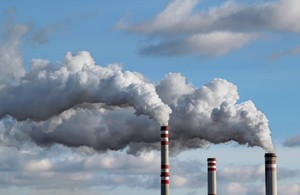New framework announced to tackle industrial emissions across the UK
UK Government establishes a new regulatory framework to boost industrial emissions standards and reduce air pollution.

Pollution caused by industrial emissions is set to be reduced and environmental performance improved under a new framework of regulation that will better protect our air, water and land.
The UK’s new Best Available Techniques framework will enable regulators and industry to work together to identify and apply up to date, challenging standards when it comes to reducing harmful emissions.
Under the permits granted by environmental regulators to industrial facilities – such as textile and chemical industries - businesses must use the best techniques available to them to prevent or minimise emissions and their impacts on the environment.
The new framework will see the UK government and Devolved Administrations (the Scottish Government, Welsh Government and DAERA) working with industry and local councils to identify these methods – known as ‘Best Available Techniques’ (BAT) - from across the UK’s largest industries. This process includes agreeing and setting emissions limits within environmental permits and determining the types of technologies and methods operators should use to reduce their environmental impact.
Building on existing levels of environmental protection, it aims to develop higher standards for industrial emissions, as the UK moves away from the EU’s regulatory framework towards one that better caters to UK businesses and the wellbeing of local communities. The collaborative approach will also give industry greater certainty to support investment that will drive forward innovation in cleaner technologies.
A new governance structure will also be established, with new independent bodies - called the Standards Council and the Regulators Group - consisting of government officials and expert regulators from all four nations of the UK. A UK Air Quality Governance Group will also be established to oversee the work of the Standards Council and the delivery of the requirements under this new framework. Interested parties from industry, academia and civil society will be able to engage in the running of the BAT system through an advisory group being set up by the UK BAT Team.
Environment Minister Steve Double said:
Tackling emissions is essential to reduce the damaging effects of air, water and land pollution on people and the environment. The new framework and collaborative approach will ensure higher standards for industrial emissions across the UK and a more effective governance structure to support industry in finding the best available techniques to meet these standards.
This builds on the wide range of actions we are already taking through our existing legal framework to drive down pollutants and improve public health and the environment.
Local councils currently play a major role in regulating industrial installations in England and Wales and have a clear interest in the impact emissions have on the health of local communities and the environment. The new regime will bring local councils into the BAT framework for the first time by involving them in the governance and standard-setting processes.
Some sectors in the UK had already begun a separate review process under the old EU BAT framework. These sectors will complete the BAT process, drawing on UK data submitted to the EU as a starting point, then tailor the BAT to meet UK circumstances.
Air pollution at a national level continues to reduce significantly. Through this new framework government is setting higher standards for the country’s largest industries and going further to prevent and minimise harmful emissions being released into the environment.
This builds on work already underway as part of the Government’s Clean Air Strategy - the most ambitious air quality strategy in a generation – which aims to halve the harm to human health caused by air pollution by 2030.